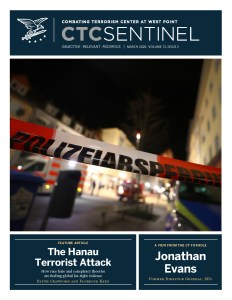From the Editor
Far-right terror is going global, propelled to a significant degree by an online ecosystem of extremists posting in English. Since 2018, attackers have targeted synagogues in Pittsburgh, Pennsylvania; the towns of Poway, California, and Halle, Germany; mosques in Christchurch, New Zealand; and a Walmart in El Paso, Texas. In this month’s feature article, Blyth Crawford and Florence Keen examine the February 19, 2020, far-right terrorist attack that targeted shisha bar customers in the German town of Hanau and led to the death of nine victims. They write that the influences on the deceased Hanau attacker Tobias Rathjen were “a combination of traditional far-right, race-based, and anti-immigration narratives, alongside several more obscure conspiracy theories.” They argue that a common denominator between the Hanau attack and the aforementioned attacks in the United States, New Zealand, and Germany “is the perpetrators’ shared adherence to the ‘Great Replacement’ conspiracy narrative … which perceives the cultural and biological integrity of the white race to be endangered by increased levels of (non-white) immigration and the stagnation of white birth rates.”
In our ongoing “A View from the CT Foxhole” series, Raffaello Pantucci interviews Jonathan Evans, who served as the Director General of the U.K. Security Service MI5 between 2007 and 2013.
Colin Clarke examines the issues raised by the December 6, 2019, terrorist attack by the Saudi Air Force Officer Mohammed Alshamrani, which killed three U.S. Navy sailors at Naval Air Station Pensacola in Florida. He writes, “In early February 2020, al-Qa`ida in the Arabian Peninsula (AQAP) claimed responsibility for the attack. It is not clear yet whether the group had a direct role in the attack, but if it did, it would make the shooting the first deadly terrorist attack on U.S. soil since 9/11 directed by a foreign terrorist organization.” By analyzing “all related-court cases since 2013,” Lorenzo Vidino, Jon Lewis, and Andrew Mines find that “save for a few exceptions, the vast majority of U.S.-based Islamic State supporters left a remarkably small financial footprint. Most, in fact, simply relied on personal savings to pay the small costs required for their activities.”
Christopher Anzalone examines al-Shabaab’s PSYOPS (psychological operations) messaging, which he argues “takes advantage of the lack of transparency in certain instances from its opponents, including some governments, and the demand by the international news media for details from on the ground, with the group framing itself as a reliable source of on-the-ground information.”
Paul Cruickshank, Editor in Chief
 Skip to content
Skip to content

